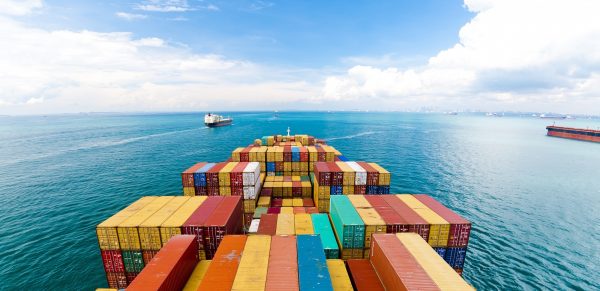The web portal Study in Greece is campaigning for the promotion and international visibility of Greek Universities and the comparative educational advantages of our country. In particular, the campaign focuses on the foreign language study programmes that Greek Universities offer to Greek and international students. The initiative is supported by the General Secretariat of Higher Education of the Ministry of Education and Religious Affairs and the General Secretariat for Greeks Abroad and Public Diplomacy of the Ministry for Foreign Affairs. In this context, a number of educational programmes and actions are presented in detail on a regular basis, such as undergraduate and postgraduate programmes, summer schools etc, to inform international students about the many foreign language options offered by Greek Universities.
Study in Greece interviewed Professor Dimitrios Skiadas, of the Department of International and European Studies of the University of Macedonia in Thessaloniki (UOM), on the Master in Shipping and Sea Transports: Economics and Politics, its features and what it has to offer to international students.
 Dr. Dimitrios Skiadas is Professor of European Governance and Jean Monnet Chair at the University of Macedonia in Thessaloniki, Greece, and Visiting Researcher at the Centre for the Study of Europe/Boston University moderated all the way from Boston Session 2 on “EU Values and Fundamental Rights”. He is Vice-President and Member of the Research Committee (Special Account of Research Funds) of the University of Macedonia. He is also an Honorary Fellow of the Association of Fellows and Legal Scholars of the Center for International Legal Studies, Salzburg (Austria).
Dr. Dimitrios Skiadas is Professor of European Governance and Jean Monnet Chair at the University of Macedonia in Thessaloniki, Greece, and Visiting Researcher at the Centre for the Study of Europe/Boston University moderated all the way from Boston Session 2 on “EU Values and Fundamental Rights”. He is Vice-President and Member of the Research Committee (Special Account of Research Funds) of the University of Macedonia. He is also an Honorary Fellow of the Association of Fellows and Legal Scholars of the Center for International Legal Studies, Salzburg (Austria).
Could you briefly describe the content, the teaching objectives and goals of the brand new Master’s degree in Shipping and Sea Transports: Economics and Politics?
The Interdepartmental Programme of Postgraduate Studies “MSc in Shipping & Sea Transports: Economics & Politics” combines teaching elements from three distinct yet interrelated scientific areas: Economics of Sea Transport and Shipping, Logistics, and International Relations. Therefore it is jointly organised by the Department of International and European Studies and the Department of Economics at the University of Macedonia in Thessaloniki (Greece). The novel element of this Programme lies with the combination of knowledge from two fields that usually are not examined together in the framework of shipping activities: economics and international relations. Thus the output of the Programme is a corpus of knowledge allowing its students to manage effectively the economic and political challenges which are relevant to the Programme’s contents. That is the reason why the Programme offers two specialisations: a) Economics of Shipping and Sea Transport, b) International Politics of Shipping and Sea Transport. The main objective of the Programme is to combine scientific knowledge and practical experience in order to produce graduates that will be in a position to pursue, with their acquired skills, a successful career and to be employed in public and private organisations and enterprises in the field of shipping. The high level and quality of studies is combined with scientific research in the relevant fields, thus allowing for a focused and practical application and use of the findings on shipping activities, and especially sea transport. The courses and the structure of the academic curriculum of the Programme are as follows:
|
1st Semester (all courses are obligatory) |
||
| Courses | ECTS | |
| Sea Transport & Shipping Services Management | 7,5 | |
| Sea Transport and Shipping Economics | 7,5 | |
| Maritime Policy, Governance & Regulation | 7,5 | |
| International Relations and Politics in Shipping & Sea Transport | 7,5 | |
|
2nd Semester (Each specialisation includes 2 obligatory courses & 2 elective courses) |
||
| Economics of Shipping and Sea Transport | International Politics of Shipping and Sea Transport | |
| Shipping Investment & Finance | Law of the Sea-Shipping Law | 7,5 |
| Quantitative Methods in Shipping and Sea Transportation Economics | Crisis Management, Negotiations, and Security | 7,5 |
| Elective course | Elective course | 7,5 |
| Elective course | Elective course | 7,5 |
|
Elective courses (In addition to the following elective courses, one of the obligatory courses of one specialisation may be selected as elective in the other specialisation) |
||
| Global Supply Chain Management | ||
| Port Economics & Policy | ||
| Regional Aspects of International Relations in Shipping and Sea Transport: Asia & Africa | ||
| Maritime Insurance | ||
| 3rd Semester | ||
| Internship | 10 | |
| Dissertation | 20 | |
The Programme is also supported through cooperations with well-known and well-established Greek shipping companies as well as with public organisations in the relevant fields such as the Port Authority of Thessaloniki.
Given that the Master’s courses are taught entirely in English, would you like to tell us why does this Master aim at attracting international students?
Shipping and Sea Transport is an activity which, by definition, has a very strong aspect of international interaction. The people involved in such activities develop an international perspective in terms of understanding their business, their countries, the society and the world in general. Therefore, selecting English as the teaching and working language of a Postgraduate Programme on the Economics and Politics of Shipping and Sea Transport seems a perfectly natural choice, given that English has been established as the working language in this field. Thus the graduates of the Programme will acquire a further competitive advantage when entering the relevant labour market, as they will familiarise themselves with the modern terminology and analysis in a language which is the main tool of communication in Shipping. Furhermore, the Programme aims at an international academic audience. Using English as a teaching and working language will attract English speaking students from abroad and particularly mainly from countries in the wider region, such as Balkan countries or countries in the eastern Mediterranean, by eliminating one of the most common concerns and obstacles when selecting a postgraduate programme, which is exactly the teaching and working language. An international small academic community, like the one envisaged for this Postgraduate Programme, will provide a suitable environment that will prepare the graduates for a career requiring not only scientific knowledge and linguistic competence but also skills of international behavior and comprehension. The fact that the provider of the Programme, the University of Macedonia, is located in Thessaloniki, has been also taken into account for seeing an international academic audience, given the increased effort for supporting the extroversion of Greece and in particular Northern Greece and promoting its growth potential. The recent developments in the fields of energy, transport, logistics in the wider region, have highlighted the possibility of the city of Thessaloniki to become an international political and economic point of reference, in which the port of the city (as well as the ports of other cities in Northern Greece) and the corresponding shipping activities will have a crucial role to play. Thus attracting international students for studies in the field of shipping, in an area where shipping is going to be one of the pillars of achieving growth, increases the outreach capacity of the area, the city, the host University at international level.
 In recent years, there has been an increase in postgraduate programmes in the field of shipping. Do you consider that this is one of the fields that Greece should invest in due to its strategic advantages?
In recent years, there has been an increase in postgraduate programmes in the field of shipping. Do you consider that this is one of the fields that Greece should invest in due to its strategic advantages?
The global economic outlook, during the last years, has been affected by various factors, the most notable being the rising trade and geopolitical tensions between the USA and China. Furthermore, the unprecedented global crisis that was brought about by the coronavirus pandemic has made the outlook for the global economy even more precarious. International seaborne trade has been significantly affected by these developments. The recession in shipping during the last year is being followed by a steady but slow improvement. This is also because, with shipping being a global industry, much of its activity takes place in the southern hemisphere, where major exporting countries of raw materials, such as Brazil, have been hit hard by COVID-19 during the last year, thus decreasing their economic activity.
Despite these developments, Greece remains at the centre of global shipping activity, as one of the top five shipping nations along with Japan, China, Singapore and Hong Kong. These five countries account for more than 50% of the world’s tonnage. In recent years Greece, Singapore, China and Hong Kong have increased the size of their fleet. Greece remains the world’s largest shipowning nation. Despite the fact that Greece accounts for only 0.16% of the world’s population, Greek shipowners own a fleet of 4,901 vessels, i.e. 19.42% of global tonnage and 58% of the European Union (EU)-controlled tonnage, as 1,706 vessel (more than 1/3 of the Greek owned fleet) fly an EU Member State flag. Between 2007 and 2019, Greek shipowners have more than doubled the carrying capacity of their fleet while they control 30.25% of the world tanker fleet, 14.64% of the world chemical and products tankers and 15.58% of the global LNG / LPG fleet, 20.04% of the world bulk carriers, and 9.53% of the world container vessels. The COVID-19 pandemic has not changed Greek shipping’s role as one of the pillars of the Greek economy, since despite a reduction of 20,16% of the Greek Balance of Payments from maritime transport, this Balance has been maintained at the very impressive figure of €13.81 billion for the fiscal year 2020.
These figures demonstrate the growth potential of the shipping sector, especially for Greece. The Greek-owned fleet is a vital component and a key facilitator of global commerce. Agricultural and forest goods, oil and oil products, gas, chemical products, iron and other ores, coal and fertilisers are among the essentials carried by the Greek-owned fleet. Greek shipping is also strategically important to the EU because, among other things, both its economy and citizens’ well-being depend on affordable energy. As the EU’s reliance on imported energy resources reaches the 58.2% for imports from Extra-EU, the Greek-owned fleet is critical in securing the EU’s diverse energy imports from all over the globe. Greek shipping is primarily an SME -driven industry that specialises in bulk / tramp shipping, which is a genuinely entrepreneurial sector with characteristics of a perfectly competitive market. This is because the sector comprises thousands of companies worldwide and is not dominated by a limited number of very large corporations-alliances, as is the case in liner shipping and most major industrial and service sectors globally. Therefore, providing such a dynamic economic sector with a properly educated, trained, qualified workforce, through novel educational schemes such the “MSc in Shipping & Sea Transports: Economics & Politics”, is one of the most significant investments that could be made in order to support its current recovery trend and its future growth.
Why should an international student choose Greece as an educational destination?
Choosing an educational destination is a multidimensional choice. At first it refers to the overall advantages of the selected location. Greece is privileged with natural beauty, with great sunny weather, magical landscapes, and rich cultural heritage. The quality of life, the attractive climate, and the classical sites are significant points of attraction but they aren’t all Greece has to offer. The country is also a vibrant research centre, with ongoing work in theoretical fields such as humanities and classics as well as in scientific fields such as medicine, biology and physics, and technology disciplines like IT, computer, and engineering, among others. There are two basic reasons for studying in Greece: the high-quality education offered by the Greek institutions across a broad spectrum of subjects and the proud tradition of scholarly inquiry –Greece has an academic heritage like few other countries in the world, having been home to the likes of Socrates, Plato, Aristotle, Hippocrates, and Pythagoras– which is being honoured by a modern academic community that offers a friendly and fruitful environment for the students who want to delve into cutting edge subjects (e.g. artificial intelligence, 4th industrial revolution, etc) as well as to some of the most crucial contemporary matters (e.g. migration, crisis management, shipping, etc). Furthermore, Greece is a member of the EU and participates fully in the modern European Higher Education Area. Plus, the cost of living in Greece is quite affordable, as compared to many other European nations, especially in the post-Brexit era. Greece is a unique place that harmoniously combines research, recreation, and reflection and connects the legendary past with the evolving present, providing a value for money destination.
 Tell us a few things about the University of Macedonia– its history, its departments, its facilities and its efforts to highlight its scientific and research work.
Tell us a few things about the University of Macedonia– its history, its departments, its facilities and its efforts to highlight its scientific and research work.
The University of Macedonia is the second University of the city of Thessaloniki and it specialises in economic and social sciences. It is a public educational entity, established as University in 1990. Previously it was widely known as the Graduate School of Industrial Studies of Thessaloniki which was founded in 1948 and become operational during the academic year 1957-1958. Thus the University of Macedonia has completed 65 years of operation as an Institution of Higher Education in Greece. Today the University of Macedonia is organised into 4 Schools and 8 academic departments as follows: the School of Economic and Regional Studies with the Department of Economics and the Department of Balkan, Slavic & Oriental Studies, the School of Business Administration with the Department of Business Administration and the Department of Accounting & Finance, the School of Information Sciences with the Department of Applied Informatics and the School of Social Sciences, Humanities and Arts with the Department of International & European Studies, the Department of Educational & Social Policy and the Department of Music Science & Art. It employs more than 200 research and teaching staff, and more than 70 special teaching staff, laboratory staff and special technical staff. There are more than 14,000 undergraduate students as well as more than 3,500 postgraduate students and PhD candidates, studying in economic, administration, social and political related fields. There are also 40 programmes of postgraduate studies organised in the University. The University’s primary consideration is the maintenance of high standards in terms of the University’s operation. The high level of graduates and professors and their participation in the shaping of new knowledge with publications of international standing, the innovative teaching methods, the modern equipment and the qualified administrative staff constitute the factors which define the university’s quality. By developing new and updating the existing Undergraduate Study Programmes, organising high-standard Postgraduate Programmes and giving emphasis on scientific research, the University of Macedonia aspires to become one of the leading Higher Education Institutions in its fields of specialisation in the Balkan Peninsula and Europe. The University also aims at responding to the needs of society, working together with public organisations and private businesses, shaping partnerships with other Universities and Research Centres in ways that complement and enhance its activities. Through its diverse initiatives and events, the University also contributes to the cultural affairs of Thessaloniki and Macedonia by maintaining a continuous interaction with citizens.
 What is your vision regarding the internationalisation of Greek HE? Which are the benefits of international Masters to the local society and economy?
What is your vision regarding the internationalisation of Greek HE? Which are the benefits of international Masters to the local society and economy?
The field of Higher Education has a constantly growing international dimension, as the mobility of its factors (academics, students, administrative and technical staff) and the nature of its contents (knowledge, skills, competences) cannot be confined within the national borders of a state. The means at the disposal of the global academic community have created a space of cooperation, of competition, of progress, of growth and development, of innovative approaches and of creation of new knowledge, a space which can be called the Global Higher Education Area. This international environment is a demanding field of action. Greece, like many other countries, has developed at national level, a significant body of academic activity, at undergraduate, postgraduate, doctoral and postdoctoral level. Despite the high quality of this activity, there is low international awareness about it, thus necessitating a significant effort of international promotion in order to increase its visibility in the Global Higher Education Area. The existence of Postgraduate Programmes of Studies is a key factor to substantiate this effort, as it allows for a first-hand experience of the quality of the Greek Higher Education for the international academic audience. Having an extensive range of disciplines studied and a corresponding amount of Programmes attended and degrees awarded in a foreign language (usually in English) is a significant tool not only to disseminate academic knowledge but also to establish academic prestige and presence in the international scene of academia. The internationalisation of the Greek Higher Education, though the implementation of international academic programmes (at postgraduate and also undergraduate levels), with enriched curricula addressed at an international student community and addressing crucial modern issues, is the main tool of establishing an effectively functioning network of Academic Diplomacy. The Greek academic community (professors, students, administrative and technical staff) as well as those from abroad who become involved in Greek Higher Education activities, either as providers or as recipients of education, can become very effective “ambassadors” of the Greek Universities and their programmes. Sharing information and spreading the word about the qualities and the capabilities of the Greek Higher Education System is the main institutional added value element in providing international programmes, especially when these programmes (at postgraduate level) highlight the potential of the Greek academic community.














